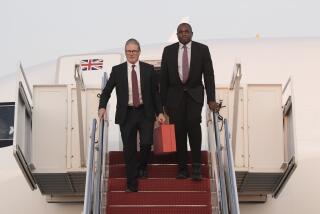U.S. Arms Experts May Visit Moscow : Nuclear cutback: Bush says the officials would explain his plans. He hails ‘world’s thirst for peace.’
NEW ORLEANS — President Bush hopes to dispatch a team of U.S. officials “soon” to the Soviet Union to “lay out directly” his new proposal to sharply reduce the U.S. nuclear arsenal, the White House said Monday.
As the United States and Soviet Union appeared to be moving ever closer to wide-ranging measures that would scale back their nuclear competition, Viktor G. Komplektov, the Soviet ambassador to the United States, met with Bush’s national security adviser in Washington and then with State Department officials to express “official Soviet enthusiasm” for the plan.
Amid a flood of upbeat reports produced by the White House on the first business day after Bush made his proposal, the President declared that “peace has a much better chance than it has had in a long, long time.”
White House Press Secretary Marlin Fitzwater said that, in a telephone call Friday, Bush gave Soviet President Mikhail S. Gorbachev an outline of his nuclear weapons proposal, adding that he would be “happy to send people” to Moscow to discuss nuclear disarmament.
On Saturday, Gorbachev called the ideas Bush had outlined “significant steps toward a nuclear-free world” and promised that the Soviet Union “will reciprocate.” He said that he and Bush had agreed to immediate U.S.-Soviet talks on accelerating the disarmament process. Gorbachev also said he had pressed Bush to end the testing of nuclear weapons, an idea that the Soviets have pushed in the past but that the United States has resisted.
Gorbachev repeated the suggestion Monday in Moscow. But in his remarks Monday, Bush made no reference to testing. Pentagon officials have contended that some nuclear testing must continue to maintain the assurance that U.S. nuclear weapons will work.
Throughout a day that otherwise was devoted to domestic and political matters, the President offered a glowing, running commentary about his arms proposal and the reception it has received. “The international reaction, I think, shows the world’s thirst for peace,” Bush said in Orlando, Fla.
But White House officials acknowledged that the elements of the President’s plan that go beyond unilateral U.S. action and require the cooperation of the Soviet Union will have to await the results of as-yet uncertain negotiations.
Fitzwater said that “conversations will continue at all levels with the Soviets.” But the continuing instability there--and the evolving independence of the Soviet republics as they reach for new authority at the expense of the central government--leaves very much up in the air answers to questions about who will take part in talks and when and where such meetings will occur.
The new U.S. arms plan, which Bush unveiled in a nationally televised speech from the Oval Office, would withdraw from Europe and Asia the United States’ short-range nuclear weapons. More than 1,000 nuclear-tipped artillery shells also would be destroyed.
Sea-launched nuclear-armed cruise missiles would be withdrawn from ships and put in storage, and development of some long-range nuclear programs, including the rail-mounted MX missile, would be halted. These steps would be taken without reciprocal Soviet action.
Bush also proposed beginning negotiations with the Soviet Union on banning multiple-warhead land-based intercontinental missiles, such as the United States’ 10-warhead MX and the Soviets’ SS-18 and SS-24.
“What I propose will preserve our own leadership, our own strength, guarantee our own national security but will significantly reduce nuclear weapons and . . . for the young people, the fear of nuclear weapons,” Bush said Monday. “I hope in some way this move now, that I think will be worldwide to reduce these weapons, will be stimulative and will offer a lot of hope to the young generations coming along.”
Fitzwater, reporting on Scowcroft’s meeting with Komplektov, said Gorbachev “wanted to be responsive,” and the Soviet leader accepted the President’s “offer of direct discussions.” But the White House spokesman told reporters traveling with Bush that it is not yet known “who will go or when. This is not a formal negotiation,” he said.
White House officials, beginning with the President, brushed aside a Washington Times report that Bush and Gorbachev could meet, along with French President Francois Mitterrand and British Prime Minister John Major, at a North Atlantic Treaty Organization session planned for the first week in November in Rome. Bush said that he is unfamiliar with such a plan and suggested that it is too early to engage in such talks.
Latest Developments
Here’s what happened Monday in the Soviet Union: * GORBACHEV REACTS: President Mikhail S. Gorbachev called for the superpowers to end the modernization and testing of nuclear weapons. He also pledged a positive response to the U.S. disarmament initiative. “The Soviet Union supports the U.S. initiative,” Gorbachev told a Kremlin news conference. But he said the proposal should be broadened. “If we are discarding nuclear weapons,” he asked, “why do we then still need nuclear tests?”
* NEW SPYMASTER: Gorbachev appointed his chief foreign policy adviser to direct KGB foreign intelligence activities. Yevgeny M. Primakov, 61, has a mandate to plan the separation of intelligence-gathering from the agency’s security and counterespionage functions. The appointment was seen as a move to break up the once all-powerful intelligence and security force.
* BACKPEDALING: The Communist regime that seized power in Tadzhikistan a week ago lifted a state of emergency and agreed to consider suspending the Communist Party and its hard-line leader, Rahmon Nabiyev. The action came after street protests by tens of thousands shouting “Resign! Resign!” outside the Parliament building.
More to Read
Sign up for Essential California
The most important California stories and recommendations in your inbox every morning.
You may occasionally receive promotional content from the Los Angeles Times.










